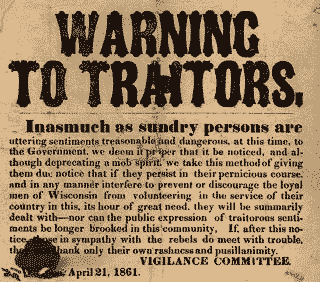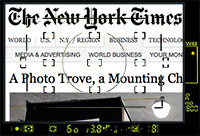Traitors Among Us?
 I know that there will be a lot of objection and offense because of this column. The problem is, it will be misdirected, because it will be directed at me.
I know that there will be a lot of objection and offense because of this column. The problem is, it will be misdirected, because it will be directed at me.
I will give myself some cover first, it's inspired by Mark Loundy's April 2007 column Common Cents: Traitors - The Fifth Column of Freelancing, in which he writes, in part:
"Every day brings news of more casualties. Media company business managers literally laugh about photographers who assist them in turning a highly skilled profession into a commodity....Yet there are those who suggest that even using the term "war" only creates an unpleasant relationship with the same folks who are unapologetically lowering rates and imposing all-rights contracts....Although there are no RPGs or IEDs aimed at us, this is no less a war. The weapons are contracts, lies and our own willingness to work "for glory." The defenses are good business practices and the courage to say no. The traitors can be found no further than the shooters who say yes."Thirty years ago, Nixon declared war on cancer, yet no real cure exists, and many people have resigned themselves to the notion that no cure will be found. War has been declared on poverty, and on countless other worthy causes. War, as defined by Dictionary.com, lists, under the several different definitions, definition #5 "aggressive business conflict, as through severe price cutting in the same industry or any other means of undermining competitors: a fare war among airlines; a trade war between nations;", and #6 "a struggle: a war for men's minds; a war against poverty;", and #12 "to be in conflict or in a state of strong opposition." To me, the war on many things is a state of mind for the combatants, and in some cases, actual actions are taken by those combatants beyond just complaining about what's going on. As a nation, we were at war with the the Axis Powers during WWII. Yet, many a citizen continued on with their lives, Others engaged, to varying degrees, in the war effort. I do see that we are at war, under the definitions above, and in using common notions to ascribe our circumstances to such.
Those that shoot assignments just "for glory" are doing the tradecraft and art of photography a grave disservice. Is is any wonder that "Pride" is one of the Seven Deadly Sins, "In almost every list Pride is considered the original and most serious of The Seven Deadly Sins, and indeed the ultimate source from which the others arise," like "Envy" (man, *I* WANTED that assignment!), "Anger" (I CAN'T BELIEVE s/he got that assignment), "Greed" (I WANT more assignments that are exciting, I don't want to do the run-of-the-mill assignments), and so on.
Those that sign off on egregeous contracts that demand WMFH and pervert the intent of the originating language as it was applied to employees, are giving aide to the enemy. Those that lie about whether or not they've signed or are working under those terms, are giving comfort to the enemy that it's ok to do what they are doing.
Ed Greenberg's Top 10 List - "My Top 10 list of things experienced photographers insist upon doing (or not), despite logic, law, money, advice and screaming" over at EP, includes, in part "Treating clients and prospective clients as if they are buddies and pals who share your self interest;"
Look around. When I would do something stupid, and my mom would call me on it, and I'd say "but mom, so-and-so was doing it too!" she would respond (and I grew up on an island in the SF bay, so this made perfect sense to me) "if so-and-so jumped off the Golden Gate Bridge, would you do that too?" To which the obvious response is, of course, "No, mom." Do you know people around you who are saying "come on, it'll be fun to jump off the bridge...let's go!"?
Just because others are signing WMFH, doesn't mean it's ok to do that. Just because people are accepting assignment fees below what will sustain anyone's business, doesn't mean it's ok to do that -- even when you'r starting out. Just because many many people are loosing this war on photographers, and succumbing to a life that does not include being a professional photographer, doesn't mean that on other fronts, for other photographers, there ar those that are continuing to succeed - and win - beyond what you could imagine.
Dictionary.com defines traitor as "a person who betrays another, a cause, or any trust." It sure sounds to me like there are a lot of photographers who fit this bill. Sadly, at a pittance of an assignment fee, and with no ownership of their creative endeavors, they won't be around long enough to know the damage they have done.
 Well known traitor Benedict Arnold was a traitor because he sought to turn over command of West Point to the Brittish in return for money and fame as a Brittish General (That's him, on the right, seeking fame and glory).
Well known traitor Benedict Arnold was a traitor because he sought to turn over command of West Point to the Brittish in return for money and fame as a Brittish General (That's him, on the right, seeking fame and glory). Ants make an ant-hill one grain of sand at a time. Eventually, it becomes big enough that it's a problem. Each assignment completed under egregous terms is that grain of sand, that over time, becomes a problem. Yet, inserted properly and with care into the right vessel, a single grain of sand (and each assignment) can become something very valuable, a pearl, or an image with resale value. A single decent-sized pearl takes from 3 to 5 years to cultivate. During the process, 50-60% of oysters die, and only 5% of the pearls from the surviving oysters will have a gem-like quality to them. So too does it take time to cultivate clients who respect your work and rights, and will pay you a fair fee for your endeavors. And, as with pearls, it's worth the wait.
Don't shoot the messenger here. If you're really angry with my criticism, it might be because it's hitting too close to home. It might be that the traitor you're looking for is staring you back at you in the mirror. To requote Mark "The traitors can be found no further than the shooters who say yes" to the bad contracts. Is that you?
Despite all this doom and gloom, there is hope. Despite the fact that there seems to be a huge void of traitors-turned-heros (and by void, I mean, I couldn't find a reference to one), if you've signed bad contracts, you can turn the corner, you can improve your lot in life. Stop working for those multi-national multi-million dollar corporations. Don't go to the folks that are the photo editors and assignment editors and who have been friendly, helpful, and understanding, and be unpleasant. When they presented you with their contract, and apologized as they were for it's content, that apology doesn't change the facts as to what they were asking for. It's not personal for them, and you should not take it personally either, it's business. Yelling at a photo editor "I won't sign this crap", or otherwise being rude is just not productive. A simple:
"I'd love to work for you, but I can't sign a WMFH contract, it's against my personal policy to do so, but I will include a fair rights package to suit your needs commensurate with appropriate fees ",or
"I'd love to do this assignment, but my fees for this are going to be a bit higher than what you've outlined you're willing to pay. I will send along my estimate, but understand if it's too high for you. If you can't find someone at that lower figure, I will do whatever I can to make the assignment happen should you call back."is all that is required of you as an upstanding professional. Operate your own business with good business practices. Do turn down egregious demands. Do take the time that you're not shooting those assignments for low or no pay and use it constructively to do self-assignments to improve your portfolio and then to locate the appropriately paying and non-rights-demanding clients.
And, take a guess as to how the now endangered staffer feels about you? When what the company is paying you is 1/2 of what it costs the company to keep the staffer, whether they admit it or not, they see you as a threat. Back in the days where unions would strike when a corporation would not increase pay commensurate with the annual cost of living increase or how well the company was doing, those that crossed the picket lines and minimized the strike's impact, were called scabs, (see def#4) , because they were protecting the "wound" that the strike was trying to inflict because they were looking out for their own self-interests (a short term benefit), and not the good of the workforce (a long term benefit). As photo department staff are reduced, and more freelancers are hired, I have heard of more than one staffer refer to the freelancers who work for their organizations as "scabs." You are a threat to them, and whether or not you know it, to your own well being.
Please post your comments by clicking the link below. If you've got questions, please pose them in our Photo Business Forum Flickr Group Discussion Threads.
 Over at
Over at  (Something akin to the deliberate decision years ago by Pets.com to make the sock puppet, at left, their official mastcot, but that's not the site that the pet store owner is objecting to). Scott, in his review cites several points, and also an interesting WSJ article, which you should click over to read. In addition, the piece notes "branding, by contrast, is like dressing for the Academy Awards: Off-the-rack won't cut it...Another option is to ditch your stock image, commission an original photo, and buy the rights..." but cautions about infringement, "...Trying to duplicate the stock photo is dangerous territory."
(Something akin to the deliberate decision years ago by Pets.com to make the sock puppet, at left, their official mastcot, but that's not the site that the pet store owner is objecting to). Scott, in his review cites several points, and also an interesting WSJ article, which you should click over to read. In addition, the piece notes "branding, by contrast, is like dressing for the Academy Awards: Off-the-rack won't cut it...Another option is to ditch your stock image, commission an original photo, and buy the rights..." but cautions about infringement, "...Trying to duplicate the stock photo is dangerous territory." The arguments continue to flow for why commissioning a photographer to produce original assignments - especially for marketing purposes - is the best way to ensure the uniqueness of your visuals that are used. There are many times when news photos - especially a single strong image of a current news event, makes it to the front page of several newspapers. This happens, of course, when the photo was not produced by a staffer, but rather a wire service or photo agency. It is then hoped that whatever text the paper runs provides a unique perspective, or, over time, readers might consider the papers interchangable, and thus, only subscribe to one.
The arguments continue to flow for why commissioning a photographer to produce original assignments - especially for marketing purposes - is the best way to ensure the uniqueness of your visuals that are used. There are many times when news photos - especially a single strong image of a current news event, makes it to the front page of several newspapers. This happens, of course, when the photo was not produced by a staffer, but rather a wire service or photo agency. It is then hoped that whatever text the paper runs provides a unique perspective, or, over time, readers might consider the papers interchangable, and thus, only subscribe to one. A sidebar in
A sidebar in 
 I have, for some time, maintained identical collections of images on both PhotoShelter and Digital Railroad. I have not drawn a conclusion that one is better than another, because each has had something different to offer. PhotoShelter, for awhile, has had their own global search capability, and today Digital Railroad has launched their comparable service, which they term Marketplace. Following on the heels of Adobe's Lightroom and Photoshop CS3, Flickr, and many Google services, they have launched in "public beta." In many cases, I think that this is a way of cushioning a product launch in case there are problems, the company can eek by by saying "oh, it's still in beta."
I have, for some time, maintained identical collections of images on both PhotoShelter and Digital Railroad. I have not drawn a conclusion that one is better than another, because each has had something different to offer. PhotoShelter, for awhile, has had their own global search capability, and today Digital Railroad has launched their comparable service, which they term Marketplace. Following on the heels of Adobe's Lightroom and Photoshop CS3, Flickr, and many Google services, they have launched in "public beta." In many cases, I think that this is a way of cushioning a product launch in case there are problems, the company can eek by by saying "oh, it's still in beta." First, let's go through pricing an image in the DRR Marketplace. Let's assume I am a photo buyer looking to secure an image of the white house at 5:30pm, EDT. I locate my image, and next to the image, under "Actions" I click "Request Photo", and the process begins.
First, let's go through pricing an image in the DRR Marketplace. Let's assume I am a photo buyer looking to secure an image of the white house at 5:30pm, EDT. I locate my image, and next to the image, under "Actions" I click "Request Photo", and the process begins. I've chosen Express Pricing, and through a series of drop-down menus, with just a few mouse clicks, I finish my selections. I've chosen "Internal Company" use, "6 months or less", and "local", and then I click "Get Price Estimate", four clicks total, and $325 pops up. If I needed to refine my use, I could, and when done, I just click "ok". Had I wanted to, I could have chosen more complex pricing, under the "Custom Licensing" tab, which allows me to specify file size, duration, and set the start date specifically, as well as the language, and any other relevant use details - "circulation, publication name, placement" and so on. Because of these additional parameters, (and rightly so), there is no "get Price Estimate" button, because this is a custom license. Once I've made all my decisions, under either Express, or Digital, I move on to the next screen.
I've chosen Express Pricing, and through a series of drop-down menus, with just a few mouse clicks, I finish my selections. I've chosen "Internal Company" use, "6 months or less", and "local", and then I click "Get Price Estimate", four clicks total, and $325 pops up. If I needed to refine my use, I could, and when done, I just click "ok". Had I wanted to, I could have chosen more complex pricing, under the "Custom Licensing" tab, which allows me to specify file size, duration, and set the start date specifically, as well as the language, and any other relevant use details - "circulation, publication name, placement" and so on. Because of these additional parameters, (and rightly so), there is no "get Price Estimate" button, because this is a custom license. Once I've made all my decisions, under either Express, or Digital, I move on to the next screen. I am presented with the following, under "Actions":
I am presented with the following, under "Actions":
 Until my pricing setup was done, each image indicated:
Until my pricing setup was done, each image indicated:
 Once I have set up my account, that text then changes to "Buy/License" and clicking on that link takes you to the following pages.
Once I have set up my account, that text then changes to "Buy/License" and clicking on that link takes you to the following pages.

 More than one person was kind enough to alert me to an interesting article about microstock and Corbis and their soon to be new CEO. In today’s New York Times article by Katie Hafner,
More than one person was kind enough to alert me to an interesting article about microstock and Corbis and their soon to be new CEO. In today’s New York Times article by Katie Hafner,  So, over in the Flickr forum, (which I must admit, I visit FAR FAR to infrequently), and interesting discussion was started by a photographer who wanted to know how to price his work - as art - for a hospital, or if he should just give it "on loan".
So, over in the Flickr forum, (which I must admit, I visit FAR FAR to infrequently), and interesting discussion was started by a photographer who wanted to know how to price his work - as art - for a hospital, or if he should just give it "on loan". Brochure? Sales Sheet? What’s the Difference?
Brochure? Sales Sheet? What’s the Difference?